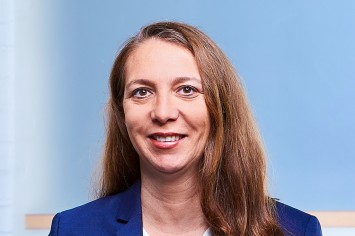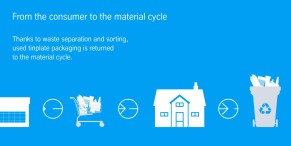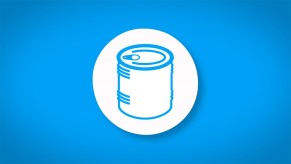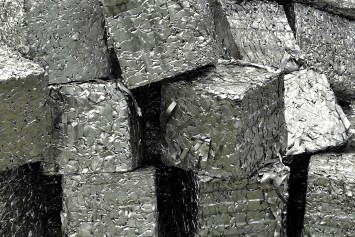Packaging steel runs in circles
Mrs Odewald, thyssenkrupp Rasselstein has been successfully running the German ‘Weissblech kommt weiter’ consumer platform for several years. What was the motivation behind this initiative?
Clarissa Odewald: Before launching the consumer platform, we commissioned a survey to find out what consumers know about packaging materials, especially tinplate. On the one hand, the result was not very surprising. The trend towards greater sustainability has long since reached the packaging industry. In addition to classic criteria such as shelf life and flavor, consumers now place importance on the recyclability of food packaging. What surprised us, on the other hand, was that consumers did not correctly assess the recycling rates of the various types of packaging. For example, the recycling rate for tinplate was estimated at 50 per cent, although it has been stable at around 90 per cent for years. This is exactly where we come in with our ‘Weissblech kommt weiter’ platform. We want to raise awareness and show why tinplate is a particularly sustainable product and an important part of our circular economy due to its material properties.
thyssenkrupp Rasselstein is also a co-founder of the food can initiative ‘Initiative Lebensmitteldose’. Why is there another platform with ‘Weissblech kommt weiter’?
The ‘Initiative Lebensmitteldose’ has existed for around 25 years and is primarily aimed at the food industry and food retailers. With our ‘Weissblech kommt weiter’ platform, we are specifically addressing end users. We want to give interested consumers an insight into the manufacturing and recycling process and show why tinplate stands out from other types of packaging. We are pursuing a holistic approach with both initiatives by addressing retailers, the food industry and consumers as well as politicians with our messages.
To what extent do you also want to address politicians with your messages?
Especially as a member of Steel for Packaging Europe, the association of European packaging steel manufacturers, but also as a company, we are in regular dialogue with politicians to give tinplate as a packaging material the recognition it deserves. Our ‘Weissblech kommt weiter’ platform also serves as a source of information here. We are currently discussing the legal changes brought about by the EU packaging regulation PPWR, which aims to promote the circular economy.
Tinplate is ahead of other packaging materials in terms of recyclability. This is partly due to the intrinsic properties of the material, which result in excellent recyclability, and partly due to the functioning and established recycling processes. With the decision to only allow recyclable packaging on the European market from 2030, the EU has sent a clear signal in favor of the circular economy. We therefore expressly welcome the PPWR.
We are also in dialogue with politicians on the topic of hydrogen supply, as the switch to hydrogen poses many challenges. These are already being addressed with initiatives such as the National Hydrogen Strategy. The decisive factor now is the pace. The expansion of production capacities and infrastructure must be driven forward on a massive scale so that the enormous demand for hydrogen can be met in the future. thyssenkrupp Steel alone will be one of the largest European customers for hydrogen.
thyssenkrupp Rasselstein's parent company thyssenkrupp Steel was also very active in the area of sustainability. As early as 2027, CO2 is to be reduced to a large extent in steel production. Will thyssenkrupp Rasselstein also benefit from climate-neutral steel?
We can only effectively combat climate change if all sectors switch to climate-neutral production. Steel is an essential building block for a sustainable energy transition. The core of our transformation is the switch from blast furnaces and coal to direct reduction (DR) plants and green hydrogen. In short: tkH2Steel®. The first hydrogen-based direct reduction plant will go into operation at the Duisburg site in 2027. The aim is to completely decarbonise the primary steel route by 2045 at the latest.
With tinplate made from bluemint® Steel, we already offer a product with reduced CO2 intensity. The material properties of the tinplate do not differ from the existing grades; however, the product is characterised by a reduction in CO2 emissions of up to 69 percent during production. The use of tinplate made from bluemint® Steel can therefore significantly reduce CO2 emissions during the production of a can.
In Andernach, we are also working on reducing our Scope 1 emissions by substituting natural gas. We are actively working to avoid emissions at the plant, i.e. in the final metres. With our new sheet lacquering line, we can save around 1,100 tonnes of CO2 per year. By transporting the hot strip coils from thyssenkrupp Steel to our plant in Andernach using locomotives that run on renewable energy or HVO (Hydrotreated Vegetable Oil), a type of bio-diesel, a further 2,000 tonnes of CO2 per year can be avoided. The long-term goal is, of course, to completely avoid Scope 1 emissions. As a first step, alternatives to the use of natural gas are being actively researched. For example, Rasselstein is an industrial partner in two projects funded by the German Federal Ministry for Economic Affairs and Climate Protection, in which the use of hydrogen as a fuel gas is being researched.
thyssenkrupp Rasselstein is a traditional company that has been producing in Andernach for more than 100 years. Even after this time, there is certainly room for innovation: Where do you see innovations for packaging steel products in the coming years?
We are seeing a trend towards CO2-reduced packaging. More and more companies are thinking about how they can position themselves more sustainably. And the use of CO2-reduced packaging is an important component of their sustainability strategies. We are very well positioned here with our range of tinplate made from bluemint® Steel.
With our packaging steel grade rasselstein® D&I Solid, we have launched the next generation of D&I material for the production of two-piece food cans. Thanks to an innovative manufacturing process in tinplate production, an increase in axial stability of 20 per cent can be achieved by using this material in D&I food cans. This opens up enormous potential for thickness reductions, which can result in material savings of up to ten per cent. In this way, we not only help to conserve resources, but also reduce the can's carbon footprint.
Our innovative packaging steel grade rasselstein® Solidflex , which is hard but at the same time particularly formable, is also worth mentioning here. As a result, rasselstein® Solidflex allows the use of thinner material thicknesses while maintaining the stability of the can. With an elongation of more than five per cent and yield strengths of 600 MPa to 750 MPa, the material is particularly suitable for applications that require not only high strength but also considerable forming potential - such as Easy Open Ends for food cans or ends and bootoms for aerosol cans.










